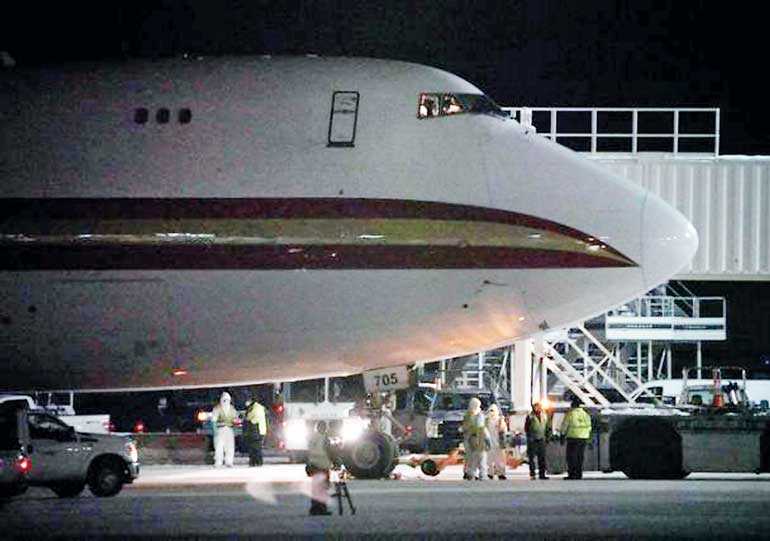Thursday Feb 19, 2026
Thursday Feb 19, 2026
Thursday, 30 January 2020 02:02 - - {{hitsCtrl.values.hits}}

An aircraft chartered by the US State Department to evacuate government employees and other Americans from the novel coronavirus threat in the Chinese city of Wuhan, is seen on the tarmac after arriving at a closed terminal at Ted Stevens Anchorage International Airport in Anchorage, Alaska, US 28 January - Reuters
BEIJING/SHANGHAI (Reuters): The United States and Japan evacuated their nationals from a quarantined city yesterday while British Airways suspended flights to mainland China where deaths from a virus leapt to 133 and major economic impact was predicted.
Beijing’s plans to slay the “devil” coronavirus may have won the trust of the World Health Organization (WHO), but confirmation of another 1,459 cases - taking the total to 5,974 in China - only fueled global public alarm.
Deaths from the flu-like virus also rose by 27 to 133.
Almost all have been in the central province of Hubei, the capital of which is Wuhan, where the virus emerged last month in a live wild animal market.
The situation remained “grim and complex”, Chinese President Xi Jinping acknowledged.
In many Chinese cities, streets were largely deserted with the few who ventured out wearing masks. Starbucks coffee shops required people to have temperatures taken and masks on.
“It’s my first time here in Asia, I feel very unlucky,” said Brazilian tourist Amanda Lee, 23, cutting short a trip. “I couldn’t even see the places I wanted, like the Great Wall.”
There was relief, however, among those evacuated from Hubei province, home to about 60 million people and under virtual lockdown. “I was extremely worried that I was stuck there,” said Takeo Aoyama, who arrived in Tokyo on a chartered plane carrying 206 Japanese out of Wuhan, with more flights planned.
The virus is weighing heavily on the world’s second-biggest economy. Companies are curbing travel to China, and airlines are cutting flights, with British Airways one of the biggest names in aviation to do so.
A government economist said the outbreak could cut China’s first quarter growth by one point to 5% or lower as the crisis hits sectors from mining to luxury goods. That may push policymakers into more stimulus measures, added Zhang Ming, an economist at the government’s Chinese Academy of Social Sciences think tank.
Hong Kong stocks took a beating on the first day of trading after the Lunar New Year break. Casino and financial stocks led the Hang Seng index 2.5% lower to a seven-month trough.
Regional markets, however, arrested their slide, with stocks in Japan, Australia, South Korea and India steady or firmer and currencies mostly stable.
Chinese markets resume trade on 3 February.
“In our view, the worst is yet to come,” securities firm Nomura said, warning of a severe, near-term blow to China’s economy.
Breakthrough in Australia?
But in a potentially major step towards finding a vaccine, scientists in Australia said they had developed a lab-grown version of the virus, the first recreated outside China.
The researchers at the Peter Doherty Institute for Infection and Immunity said they would share the sample, grown from an infected patient, with the WHO and global laboratories in the hope of hastening immunisation and detection.
Australia’s government said it would help some citizens leave and quarantine them on Christmas Island, best known for housing asylum seekers.
The US Centers for Disease Control and Prevention said about 210 Americans had been flown out of Wuhan and would be screened several times on arrival in California.
The White House was weighing whether to suspend flights to China, US officials said, though it had decided against for now.
The number of cases in China now exceeds its tally of 5,327 infected with the Severe Acute Respiratory Syndrome (SARS) coronavirus that killed about 800 people globally in 2002 and 2003.
While some experts believe the new strain, known as “2019-nCoV”, is not as deadly as SARS, alarm has grown over its rapid spread and many unknown attributes, such as how lethal it is.
“There have been more cases in China, but so far with a lower death rate than the SARS outbreak,” said Michael Head, a senior health researcher at Britain’s University of Southampton. “A pandemic is typically called by the World Health Organization after there has been sustained transmission across many countries. Though there have been cases reported in several countries now, we’re not quite at that stage of sustained transmission yet.”
Like other respiratory infections, the new virus is spread by droplets from coughs and sneezes, with an incubation time between one and 14 days.
About 60 cases, but no deaths, have been reported in 15 other countries, from Singapore to the United States.
In the first known cases in the Middle East, the United Arab Emirates diagnosed four members of a Chinese family who arrived from Wuhan with the coronavirus.
Hubei governor Wang Xiaodong said the outbreak in Huanggang city was also severe and it must not be allowed to become a second Wuhan. Companies in the province should not resume work before Feb. 13, he told reporters.
“The most difficult part is to be at home most of the day. It is safer to stay away from other people,” said Emilia, 28, a research scientist and Russian national in Wuhan.